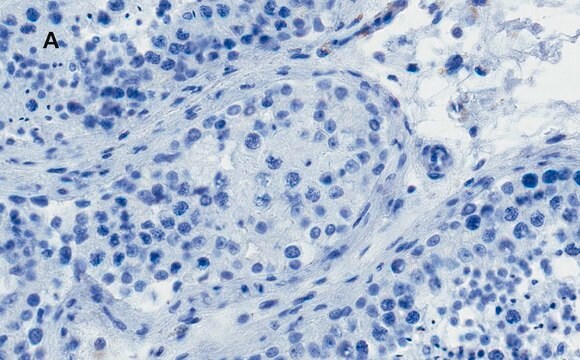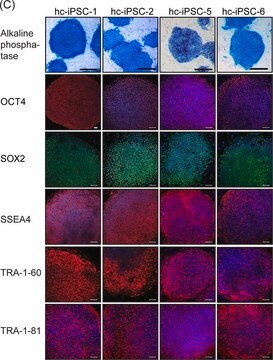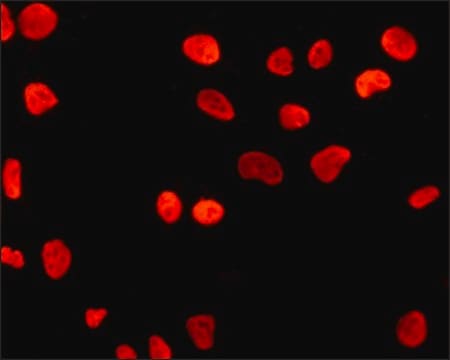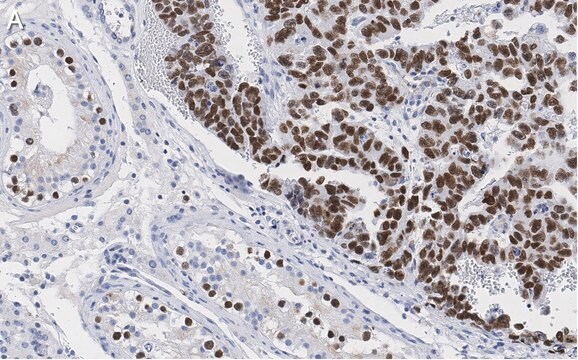추천 제품
생물학적 소스
mouse
Quality Level
결합
ALEXA FLUOR™ 488
항체 형태
purified immunoglobulin
항체 생산 유형
primary antibodies
클론
7F7.1, monoclonal
종 반응성
human
기술
immunocytochemistry: suitable
동형
IgG2a
NCBI 수납 번호
UniProt 수납 번호
배송 상태
wet ice
타겟 번역 후 변형
unmodified
유전자 정보
human ... NANOG(79923)
일반 설명
NANOG (Homeobox protein NANOG) is a member of the Nanog homeobox family of DNA-binding proteins. It is expressed in embryonic stem cells and confers pluripotency on these cells. Once embryonic stem cells become differentiated, NANOG expression is suppressed. NANOG is involved in the Hedgehog/Gli1 signaling pathway which has been implicated in the development and growth of various types of tumors. NANOG has also been identified as a key transcription factor used to generate induced pluripotent stem cells.
애플리케이션
Anti-NANOG Antibody, clone 7F7.1, Alexa Fluor 488 conjugate.
품질
Evaluated by Immunocytochemistry in H9 human embryonic stem cells. Immunocytochemsitry Analysis: A 1:100 dilution of this antibody detected NANOG in H9 human embryonic stem cells.
표적 설명
The uncojugated parent antibody (Catalog No. MABD24) has an observed MW of 39 kDa
물리적 형태
Purified mouse monoclonal IgG2a conjugated to Alexa Fluor™ 488 in PBS with 0.1% sodium azide and 15mg/ml BSA.
기타 정보
Concentration: Please refer to the Certificate of Analysis for the lot-specific concentration.
법적 정보
ALEXA FLUOR is a trademark of Life Technologies
적합한 제품을 찾을 수 없으신가요?
당사의 제품 선택기 도구.을(를) 시도해 보세요.
Storage Class Code
12 - Non Combustible Liquids
WGK
WGK 2
Flash Point (°F)
Not applicable
Flash Point (°C)
Not applicable
시험 성적서(COA)
제품의 로트/배치 번호를 입력하여 시험 성적서(COA)을 검색하십시오. 로트 및 배치 번호는 제품 라벨에 있는 ‘로트’ 또는 ‘배치’라는 용어 뒤에서 찾을 수 있습니다.
Breanna S Borys et al.
Stem cell research & therapy, 12(1), 55-55 (2021-01-14)
Human induced pluripotent stem cells (hiPSCs) hold enormous promise in accelerating breakthroughs in understanding human development, drug screening, disease modeling, and cell and gene therapies. Their potential, however, has been bottlenecked in a mostly laboratory setting due to bioprocess challenges
Victor J T Lin et al.
Scientific reports, 7(1), 5005-5005 (2017-07-12)
Despite their well-known function in maintaining normal cell physiology, how inorganic elements are relevant to cellular pluripotency and differentiation in human pluripotent stem cells (hPSCs) has yet to be systematically explored. Using total reflection X-ray fluorescence (TXRF) spectrometry and inductively
Breanna S Borys et al.
Stem cells translational medicine, 9(9), 1036-1052 (2020-05-24)
Human induced pluripotent stem cells (hiPSCs) have generated a great deal of attention owing to their capacity for self-renewal and differentiation into the three germ layers of the body. Their discovery has facilitated a new era in biomedicine for understanding
Melissa Conti Mazza et al.
Stem cell research, 55, 102506-102506 (2021-08-23)
Mutations in the oncogene PARK7, which codes for DJ-1, have been associated with early-onset autosomal recessive Parkinson's disease (PD); however, the exact role of DJ-1 in PD remains elusive. Fibroblasts from a PD patient with a uniparental disomy, 1 bp deletion
Vanessa Sauer et al.
Cell transplantation, 25(12), 2221-2243 (2016-08-12)
Although several types of somatic cells have been reprogrammed into induced pluripotent stem cells (iPSCs) and then differentiated to hepatocyte-like cells (iHeps), the method for generating such cells from renal tubular epithelial cells shed in human urine and transplanting them
자사의 과학자팀은 생명 과학, 재료 과학, 화학 합성, 크로마토그래피, 분석 및 기타 많은 영역을 포함한 모든 과학 분야에 경험이 있습니다..
고객지원팀으로 연락바랍니다.
![Anti-OCT-4 [POU5F1] Antibody, clone 7F9.2 clone 7F9.2, from mouse](/deepweb/assets/sigmaaldrich/product/images/307/874/7354f72d-80ee-40a5-b7fa-0590fe6784cc/640/7354f72d-80ee-40a5-b7fa-0590fe6784cc.jpg)






